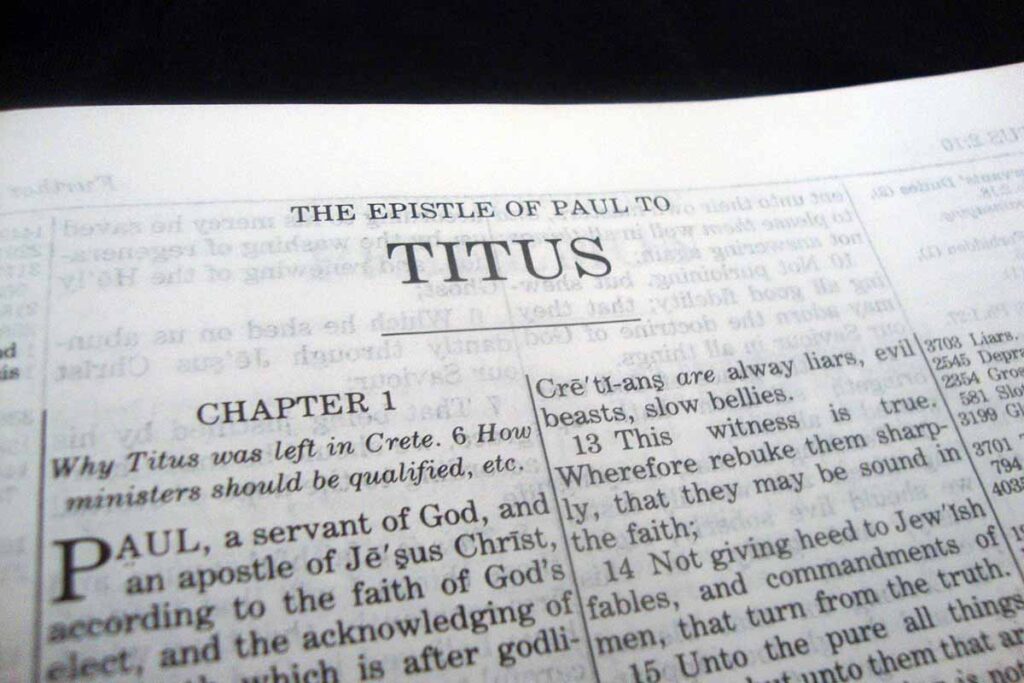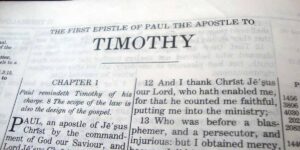The Book of Titus
Titus was a Greek believer. Taught and nurtured by the Apostle Paul, he stood before the leaders of the church in Jerusalem as a living example of what Christ was doing among the Gentiles. Like Timothy, he was one of Paul’s trusted traveling companions and closest friends. Later he became Paul’s special ambassador and eventually the overseer of the churches on Crete. Slowly and carefully, Paul developed Titus into a mature Christian and a responsible leader. The letter to Titus was a step in the discipleship process. As with Timothy, Paul told Titus how to organize and lead the churches.
Paul calls for church order and right living on an island known for laziness, gluttony, lying, and evil. The Christians are to be self-disciplined as individuals, and they must be orderly as people who form one body, the church. We need to obey this message in our day when discipline is not respected or rewarded by our society. Although others may not appreciate our efforts, we must live upright lives, obey the government, and control our speech. We should live together peacefully in the church and be living examples of our faith in contemporary society.
Paul’s letter to Titus is brief, but it is an important link in the discipleship process – helping a young man grow into leadership in the church. As you read this personal letter, you will gain insight into the organization and life of the early church, and you will find principles for structuring contemporary churches. But you should also see how to be a responsible Christian leader. Read the letter to Titus and determine, like Paul, to train men and women to lead and teach others.
Writer of Titus
Written by the Apostle Paul, “a servant of God, and an apostle of Jesus Christ” (Titus 1:1). The circumstances were the same as those under which the apostle Paul wrote the letters to Timothy. The Pastoral letters were written during the fourth missionary journey between Paul‘s two Roman imprisonments.
Date Written
Sometime after Paul left Rome, he and Titus went to Crete (Titus 1:5). Titus was left there after Paul’s departure. Paul wrote this personal letter to Titus thereafter (between 63-66). Written from Nicopolis (city of victory). Although there were several cities with this name, Titus was probably aware of which city it was.
To Whom Written
To Titus, “mine own son unto the common faith,” (Titus 1:4).
Purpose of Titus
The purpose of the book was to advise Titus as to how to set things in order among the believers in Crete and how to choose community leaders there during the dispensation of grace, in the absence of divine inspiration to ensure the accomplishment of these things.
Historical Setting
A number of Jews from Crete were present in Jerusalem at the time of Peter’s sermon on the Day of Pentecost (Acts 2:11). Some of them may have believed in Christ and introduced the gospel to others on the island upon their return. According to Titus 1:5, Paul left Titus on Crete to continue establishing churches by appointing “elders in every city.”
Theological Contribution of Titus
Titus emphasizes sound doctrine and challenges believers to good works. Paul included three doctrinal sections in this letter to emphasize that proper belief gives the basis for proper behavior.
Recommended Bible Study Resources
ESV Study Bible – Study Bibles give you a deeper understanding of God’s Word with tools for life application like commentary, maps, charts, concordance, and study notes. Search our popular translations- NIV, ESV, NKJV, KJV and more!
Believer’s Bible Commentary: Second Edition – A Bible commentary is a written, systematic series of explanations and interpretations of Scripture. Commentaries often analyze or expound on individual books of the Bible, chapter by chapter and verse by verse. Some commentary works provide analysis of the whole of Scripture.
The New Strong’s Expanded Exhaustive Concordance of the Bible – The best concordance for word study! This exclusive new edition of a legendary classic puts generations of biblical research at your fingertips. A valuable tool for pastors, teachers, and students of the Bible.
Vine’s Complete Expository Dictionary of Old and New Testament Words – This classic word study resource allows you to study the meaning of biblical words in the original languages without spending years learning Greek or Hebrew. A great resource for students, seasoned pastors, and anyone who enjoys biblical word studies–even if they have little to no formal training in Hebrew or Greek.
Halley’s Bible Handbook – The beloved and classic Bible companion has been thoroughly updated, while retaining its time-honored features and Dr. Halley’s highly personal style, to offer even greater clarity, insight, and usefulness.
Click here to download or print the Bible outline “Titus – Leadership in the Church“.





